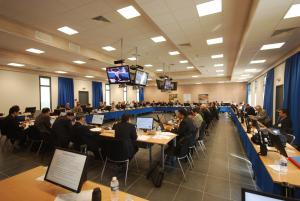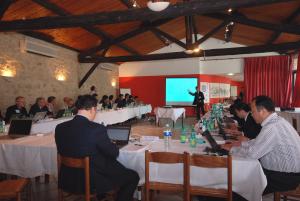Meeting week in Cadarache
When Victor Vdovin came to Cadarache for the first time in 1975, he and his colleagues from the Kurchatov Institute in Moscow were welcomed at the Château with the words "welcome to the future site of the JET facility." Fusion, in those days, was not part of the CEA-Cadarache's portfolio ... Tore Supra did not even exist on paper ... and, as you've guessed, the location of the Joint European Torus had not yet been decided.
35 years later, the Russian fusion scientist—who has contributed to fusion history by participating in the construction of many tokamaks, amongst them TM-1 which was later upgraded, renamed CASTOR and moved to the Czech Republic—was back in Cadarache. This time, Vdovin had come to southern France to participate as a senior expert to the ITER Science and Technology Advisory Committee (STAC) that assembled once again in the medieval setting of the Château de Cadarache.




